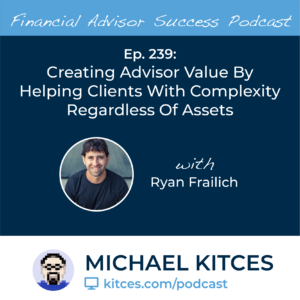 Welcome back to the 239th episode of the Financial Advisor Success Podcast!
Welcome back to the 239th episode of the Financial Advisor Success Podcast!
My guest on today's podcast is Ryan Frailich. Ryan is the founder of Deliberate Finances, an RIA located in New Orleans, Louisiana that serves young professionals using a monthly subscription fee model.
What's unique about Ryan, though, is that he’s intentionally built his advisory business in such a way that allows him to help people in their 20s, 30s, and 40s navigate the inevitable financial complexities in their lives… regardless of whether or not they have liquid assets that need managing.
In this episode, we talk in depth about Ryan’s experience that, while the industry typically assumes clients with limited assets have little financial complexity, in practice, it’s often the journey of getting to the point of actually having assets to manage that is the more complex part of the journey, why Ryan finds that the tendency of financial advisors to not specialize (unlike other professionals, such as doctors, who use different titles to differentiate amongst specialties), makes it challenging for consumers to find someone who can help with their particular pain points, and how Ryan has structured his subscription model with a varying price range specifically to align to the specialized and complex needs of his younger clientele as their own careers evolve and their income grows.
We also talk about Ryan’s commitment to remaining a solo advisor and how that makes focusing on making sure he is serving only his ‘ideal’ client all the more important to the success of his business, the third-party services that Ryan refers clients out to for their estate planning, insurance, and even investment needs (which ultimately allows Ryan to maximize the time he spends in the planning areas where he adds the most value), and why Ryan has implemented surge meetings in order to achieve the sort of work/life balance that is important to him and his family.
And be certain to listen to the end, where Ryan shares why he provides a Client Engagement Standard in his onboarding process as a way to set clear expectations around both his and his clients’ relationship responsibilities (especially given his lifestyle practice), the expertise that Ryan has developed around student loan planning as a way to differentiate himself even further, and why Ryan’s background as a teacher coming into the financial planning business has allowed him to eschew the industry’s ‘traditional’ definitions of success and create his own business goals to maximize his financial and family wellbeing.
So whether you’re interested in learning how Ryan’s structured his business to serve clients who aren’t good fits for the traditional AUM model, how he helps his clients with student loan planning, or why he’s committed to remaining a solo advisor, then we hope you enjoy this episode of the Financial Advisor Success podcast, with Ryan Frailich.








 Welcome back to the 238th episode of the Financial Advisor Success Podcast!
Welcome back to the 238th episode of the Financial Advisor Success Podcast!

